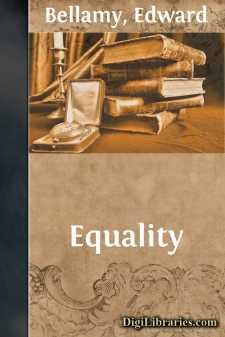Categories
- Antiques & Collectibles 13
- Architecture 36
- Art 48
- Bibles 22
- Biography & Autobiography 813
- Body, Mind & Spirit 142
- Business & Economics 28
- Children's Books 17
- Children's Fiction 14
- Computers 4
- Cooking 94
- Crafts & Hobbies 4
- Drama 346
- Education 46
- Family & Relationships 57
- Fiction 11829
- Games 19
- Gardening 17
- Health & Fitness 34
- History 1377
- House & Home 1
- Humor 147
- Juvenile Fiction 1873
- Juvenile Nonfiction 202
- Language Arts & Disciplines 88
- Law 16
- Literary Collections 686
- Literary Criticism 179
- Mathematics 13
- Medical 41
- Music 40
- Nature 179
- Non-Classifiable 1768
- Performing Arts 7
- Periodicals 1453
- Philosophy 64
- Photography 2
- Poetry 896
- Political Science 203
- Psychology 42
- Reference 154
- Religion 513
- Science 126
- Self-Help 84
- Social Science 81
- Sports & Recreation 34
- Study Aids 3
- Technology & Engineering 59
- Transportation 23
- Travel 463
- True Crime 29
Looking Backward, 2000 to 1887
by: Edward Bellamy
Categories:
Description:
Excerpt
Chapter 1
I first saw the light in the city of Boston in the year 1857. "What!" you say, "eighteen fifty-seven? That is an odd slip. He means nineteen fifty-seven, of course." I beg pardon, but there is no mistake. It was about four in the afternoon of December the 26th, one day after Christmas, in the year 1857, not 1957, that I first breathed the east wind of Boston, which, I assure the reader, was at that remote period marked by the same penetrating quality characterizing it in the present year of grace, 2000.
These statements seem so absurd on their face, especially when I add that I am a young man apparently of about thirty years of age, that no person can be blamed for refusing to read another word of what promises to be a mere imposition upon his credulity. Nevertheless I earnestly assure the reader that no imposition is intended, and will undertake, if he shall follow me a few pages, to entirely convince him of this. If I may, then, provisionally assume, with the pledge of justifying the assumption, that I know better than the reader when I was born, I will go on with my narrative. As every schoolboy knows, in the latter part of the nineteenth century the civilization of to-day, or anything like it, did not exist, although the elements which were to develop it were already in ferment. Nothing had, however, occurred to modify the immemorial division of society into the four classes, or nations, as they may be more fitly called, since the differences between them were far greater than those between any nations nowadays, of the rich and the poor, the educated and the ignorant. I myself was rich and also educated, and possessed, therefore, all the elements of happiness enjoyed by the most fortunate in that age. Living in luxury, and occupied only with the pursuit of the pleasures and refinements of life, I derived the means of my support from the labor of others, rendering no sort of service in return. My parents and grand-parents had lived in the same way, and I expected that my descendants, if I had any, would enjoy a like easy existence.
But how could I live without service to the world? you ask. Why should the world have supported in utter idleness one who was able to render service? The answer is that my great-grandfather had accumulated a sum of money on which his descendants had ever since lived. The sum, you will naturally infer, must have been very large not to have been exhausted in supporting three generations in idleness. This, however, was not the fact. The sum had been originally by no means large. It was, in fact, much larger now that three generations had been supported upon it in idleness, than it was at first. This mystery of use without consumption, of warmth without combustion, seems like magic, but was merely an ingenious application of the art now happily lost but carried to great perfection by your ancestors, of shifting the burden of one's support on the shoulders of others. The man who had accomplished this, and it was the end all sought, was said to live on the income of his investments....












